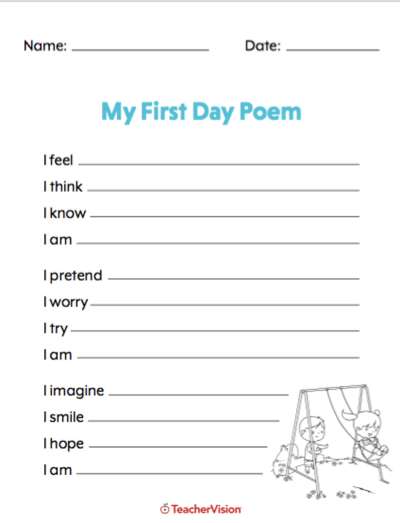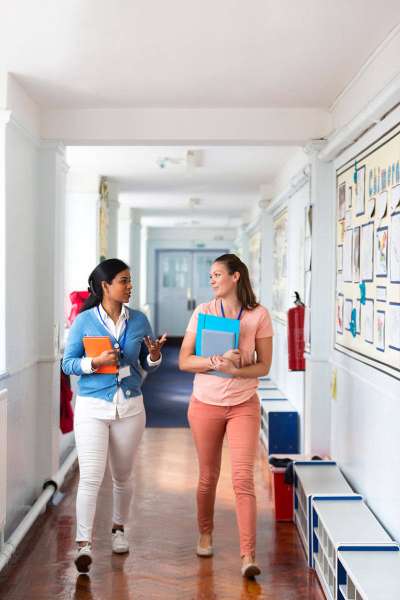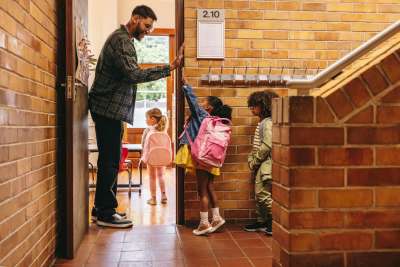Dr. Karla Bester has a passion for education and served as a teacher for more than 20 years before becoming a Director of Programs for an education company. She has developed, implemented, and managed a variety of programs that have supported and helped educators excel both inside and outside of the classroom.
Here, she shares her expertise to provide back to school night ideas and helpful advice to create a successful back to school night, open house or meet the teacher night.
Back to School Night Ideas to Turn Parents Into Partners
Back to school night is much more than a formal meeting with parents— it's an opportunity to build relationships and set the foundations for positive communication and student support.
These nights allow teachers to meet parents, discuss curriculum and expectations, and start the school year on a positive note.
That’s why we’ve created this complete guide to back to school night ideas to help you prepare for this event and turn parents into partners.

What’s the Purpose of Back to School Night?
Back to school night allows parents an insight into what their children will learn in your class this school year. It’s an opportunity for them to get to know you as the teacher and understand the curriculum, as well as ask any questions they may have. Overall, it serves as a great platform for establishing a positive relationship between parents and teachers from the very beginning of the school year.
What to Expect on Back to School Night
Typically, back to school night will begin with an introduction to yourself and, if applicable, the subject you teach. You may want to include your professional and teaching background, as well as some fun facts about yourself.
Next, you’ll want to introduce the curriculum to parents. Consider handing out copies of your syllabus and any other classroom forms that might be helpful for parents. Be sure to also let them know about any important dates throughout the school year. Now is also a good time to discuss homework policies, grading, and expectations for student behavior.
Teachers should also prepare for questions from parents. These might range from specific concerns about the curriculum to broader queries about classroom management or communication. Back to school night is a good opportunity for teachers to share how they plan to keep parents informed about their child's progress and how parents can best support their child's learning at home.
TeacherVision’s Top Back to School Night Tips

1. Prepare Ahead of Time
Preparing ahead of time is the key to making the most of back to school night. Gather all the necessary information and everything you need, such as curriculum and class schedules, and plan a presentation that is both informative and engaging. Be sure to have materials, such as handouts and visuals, ready to hand out to parents for them to take home. This should also help you feel more prepared to answer any questions parents may have.
2. Greet Parents Warmly
This is when you can make an excellent first impression with parents. Greet them with a warm and welcoming smile, introduce yourself as their child’s classroom teacher, and shake their hands. This small gesture can establish a good rapport with students’ parents early on.
3. Invite Parents to Participate
Encourage parental involvement in the classroom by inviting them to participate in activities such as volunteering, chaperoning field trips, and helping with homework. This involvement can create a sense of ownership in the classroom and promote a collaborative learning environment.
Providing sign-up forms after your presentation helps create a low-pressure environment that encourages parents to get involved and gives them options to support in the way that best suits their circumstances. This might include a classroom supplies request form, parent participation form, student reading inventory, or a teacher feedback form to take away and return later in the school year.
4. Make Time for Individual Parent-Teacher Conferences
During back to school night, create time for one-on-one parent-teacher conferences that address individual concerns and issues regarding their child's academic performance and behavior. Take the time to listen to their concerns and answer any questions.
Giving personalized attention to each student's parent could improve the relationship you build with the parents and, ultimately, their level of engagement with their child's education.
Communication forms and templates are great to use during the first week of school or to have prepared for back to school night.
5. Create an Open-Door Policy
Make it clear to parents that they are always welcome to communicate with you throughout the school year. Provide contact information such as your email, phone number, or office hours. Encouraging an open-door policy can ensure that parents feel comfortable asking questions or voicing concerns whenever needed.
6. Follow-up
After back to school night, follow up with parents to reinforce the information shared, encourage communication, and address any further questions they may have. Keep them updated on classroom events and student accomplishments throughout the year with newsletters, calendars, or special events they could attend.
By building a strong communication network between the school, teachers, and parents, the parents can become partners in shaping their child's educational journey and overall School-life balance.
Back to School Night Ideas and Activities
Below are some back to school night ideas to keep parents engaged while learning about the upcoming school year.

1. Create an Interactive Presentation or Slideshow
Create an interactive presentation that involves parents and provides opportunities for them to ask questions about your teaching methods.
An introductory slideshow about yourself is a fun way for parents to get to know you and to remember you better after the back to school night.
Alternatively, consider making a Kahoot to quiz parents about some of the concepts you’ll be teaching their children this year.
As you do this, it will show them how meaningful their participation is in their child's education and help establish a stronger relationship between the parents, teachers, and students.
2. Walk Them Through a Typical Day In Your Class
While explaining your curriculum to the parents, consider walking them through a day in your class. Have them rotate between learning centers, complete group work, or complete a quick project-based learning unit to give them a taste of the curriculum.
3. Do a Classroom Scavenger Hunt
Get students’ parents familiar with the classroom by handing out a list of objects for them to identify when they first enter the class. This is a fun back to school night activity to help parents get acquainted with the classroom and break the ice.
4. Play Icebreaker Games
Icebreaker games are a fantastic way to get to know your students’ parents. TeacherVision has an extensive menu of Icebreaker and Get to Know You activities to choose from.
Consider playing the same icebreaker games with parents that you’ll play with the class on the first day of school. This will give parents a good idea of what they can expect their children to do in your class.
5. Showcase Student Work
Displaying past students' work can give parents a sense of what their child will be working on during the year. It also offers an opportunity to highlight the level of creativity and effort you expect from your students. This is an especially great idea if you’re an art teacher!
Back to School Night Checklist
To make your back to school night easier, here is a checklist of items you may want to have handy:
- Copies of classroom rules and expectations
- Copies of curriculum or syllabus
- List of important dates for the school year
- List of classroom supply needs
- Sign-up forms for parent volunteers
- Contact information for parents to reach you
- Plan for individual parent-teacher meetings
- Classroom layout and seating plan
- Samples of textbooks or other learning materials
- Details of homework policies
- Explanation of grading system
- Information on how parents can stay involved throughout the year
- Details of your open-door policy for parents
- A follow-up plan after the back to school night
More Back to School Resources for Teachers
Looking for more resources for the new school year? Visit our back to school headquarters for full lesson plans, activities, guides, and new teacher resources!
If you’re a new teacher, be sure to also check out TeacherVision’s New Teacher Resources.














